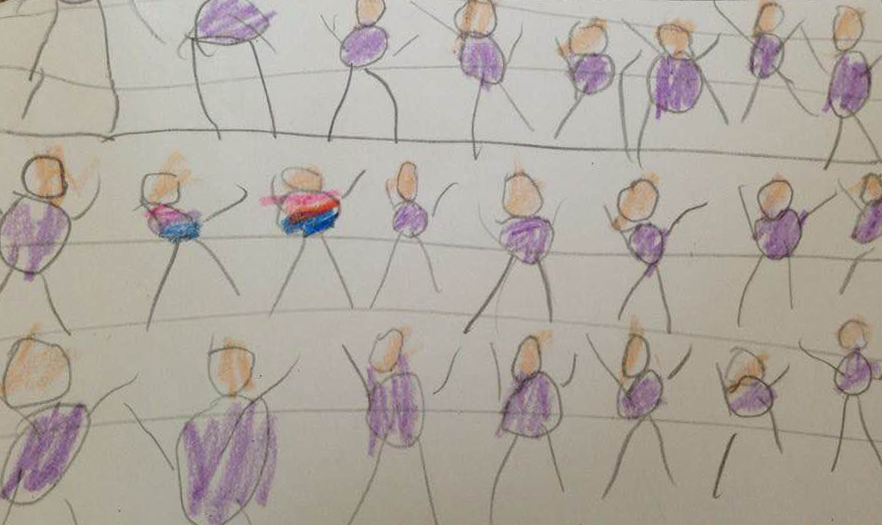In a recent study of the psychosocial impact of developmental prosopagnosia (DP) on children and their families, Dr. Kirsten Dalrymple and her colleagues in the USA, Canada, and the UK interviewed eight kids with DP and their parents, about their experiences with DP. The interviews revealed certain recurring themes among these kids and parents, in terms of their main concerns and their strategies for coping with DP.
The main concerns of the kids included an inability to recognize friends and teachers, highly complex yet unreliable strategies for recognizing friends and family, and a fear of being teased or criticized by a peers whom they fail to recognize.
The main concerns of the parents included safety, as they know their child may be unable to distinguish familiar individuals from strangers; a desire to better understand their child's experience with DP; and a drive to help their child cope with DP.
Strategies the kids used to avoid social embarassment in spite of their face recognition challenges include asking the person's name outright; paying attention to the person's clothing, jewlery, skin color, hair style, teeth, eyes, face shape, face size or other prominent features; listening to the person's voice; using cues such as name tags on desks; and avoiding the use of that person's name altogether.Parents often helped their kids when they couldn't recognize someone by telling them who that person is, or by more subtly using that person's name in conversation.
This work was recently published in the Journal of Psychosomatic Research. The following excerpts are taken from this work.
Drawing by 6-year-old boy with DP, depicting his experience trying to find group leaders in tie-dye shirts among group members in purple.
WHAT KIDS SAY*
Lorraine (6-years-old): So all I do to find the right Holly is to look at both Hollys and say OK, so I want the one with ... a striped shirt ... light colored skin ... the hair like I have, and also no bracelets...
Harry (9-years-old): I keep calling Claire, Laura
Research team member (RTM): And what do they say when you do that?
Harry: [laughs] Oh we all laugh and joke about it a lot
RTM: Oh so they find it funny?
Harry: Yeh, very funny
RTM: And do you find it funny?
Harry: Yeeee eh, only sort-of
RTM: Sort of how do you find it then if it's sort-of-funny?
Harry: Eee I don't mind it, but I don't find it very funnyJohn (10-years-old): ... [my math teacher] got her haircut and it confused me a lot
Rose (12-years-old): ... It does bother me and it does get on my nerves if it happens over and over
RTM: Does it stop you from doing anything?
Rose: ... sometimes it feels like I can't hang out or do what my friends wanna do, yeahThomas (14-years-old): Like, erm, when you, like, meet into people and er, like, you can't recognize them it can just be awkward you know...It's also awkward when er, like, you're, like, somebody's waving to you or, and you think they're waving to you and you don't really know who they are cuz you can't recognize them and you wave back and turns out they were waving to someone behind you
RTM: ...how does it make you feel?
Thomas: Embarrassed mostly yeah
RTM: Why do you think you feel embarrassed?
Thomas: It's more when I, say, call them by the wrong name or something and they say, "that isn't my name" or something like that, but it's just awkward you know.
WHAT PARENTS SAY*
Emma (parent of 5-year-old Chloe): ...we were in a playground at the zoo and, you know, it was chaotic, and there were a lot of parents, and she went up to someone, and was talking to this person and thought it was me, and then shortly after that we were in a restaurant in line and she went up to this woman and she was, like, hugging her and pulling at her dress, not just like 'oh you're not my mom' it was like she really had no idea that it wasn't me until I stopped and told her that.
Abigail (parent of 6-year-old Lorraine): ... [we'll be] at the Zoo or something, I'll see a little look of panic when she looks around at all the faces and it's like 'which one's Mom?' And of course I'll rush right up to her, umm, so that she knows who I am.
Julia (parent of 8-year-old Andrew): ...it doesn't seem to affect him yet but I'm just worried that in the future, so I guess I worry about it, all the kids and, you know... he went to, like, two birthday parties last year, he's not invited to a lot because he doesn't hold onto friendships cuz he can't remember anybody, so I mean that worries me, but right now it's ok and I'm trying to deal with it. It's ok for him right now, he's not bothered so I should not be bothered.
Jane (parent of 9-year-old Harry): ...when he started [Cub Scouts], I mentioned it to the Cub leader...I'm always aware that [safety] might be a problem when we're not with him to watch who he wanders off with. If everybody's in Cubs uniform I'm slightly concerned that he'll just take the wrong person's hand and just take off or wander away... stranger danger the only [challenge] I'd say.
Joanne (parent of 10-year-old John): ...and I thought, 'well no wonder you don't want to be friendly and talk to some of these kids because you don't know who they are', it's a room full of strangers every day... I feel that there's a lot of potential for friendships in his life that perhaps don't get to be fulfilled because he doesn't always come across as friendly as maybe he would if he were able to recognize faces.
* Pseudonyms were used throughout to protect child and parent identities
